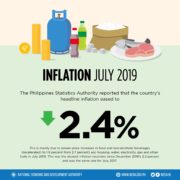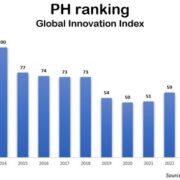
Pasig City — The National Economic and Development Authority expects inflation to settle within the government’s target of 2.0 to 4.0 percent this year as it further slides to its slowest rate in 31 months.
The Philippine Statistics Authority reported on August 7 that the country’s headline inflation eased to 2.4 percent in July 2019, bringing the year-to-date inflation to 3.3 percent.
This outturn is mainly due to slower price increases in food and non-alcoholic beverages (decelerated to 1.9 percent from 2.7 percent) and housing, water, electricity, gas and other fuels in July 2019. This was the slowest inflation recorded since December 2016’s 2.2 percent and was the same rate for July 2017.
Rice deflation also was observed for the third consecutive month, reaching -2.9 percent in July 2019.
“We welcome this decelerating trend in prices but we remain on guard against possible upside risks such as adverse weather condition, possible entry of the African swine fever, and uncertainty in the global oil market, among others,” Socioeconomic Planning Secretary Ernesto M. Pernia said.
The Philippine Atmospheric, Geophysical, and Astronomical Services Administration or Pagasa expects the Southwest monsoon or Habagat to peak in the period July to September 2019.
Moreover, the agency said that 6 to 9 tropical cyclones are expected in the third quarter, while another 3 to 5 tropical cyclones could enter the Philippine Area of Responsibility in the last quarter of 2019.
“Government agencies such as Department of Agriculture, Department of Trade and Industry, and the National Food Authority should ensure sufficient supply of basic food commodities, in view of the expected tropical cyclones that will enter the Philippine Area of Responsibility,” he said.
Meanwhile, as part of the government’s continued efforts to prevent the entry of African swine fever (ASF) to the country, the Food and Drug Administration temporarily banned the importation of pork meat products from Hong Kong, North Korea, and Germany, alongside 17 other ASF-infected areas.
“The concerned authorities should intensify its market surveillance to ensure the compliance of importers and retailers with the government’s directive. The government should also ensure that there is sufficient production of pork and other meat products locally, while the threat of the epidemic is seen to continue in the near term,” said Pernia.
—
Stay updated with news and information from the National Economic and Development Authority by visiting their website at http://www.neda.gov.ph.






